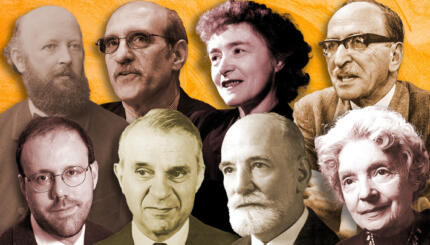Jewish parents are famous (in some circles, infamous) for anxiously hovering over their children. “A Jewish man with parents alive,” Philip Roth wrote in Portnoy’s Complaint, “is a 15-year-old boy, and will remain a 15-year-old boy until they die.”
A rabbi I know, who grew up in the intensely Orthodox neighborhood of Borough Park, Brooklyn, told me that it was his wife who taught him that one could express love for one’s children by taking pleasure in their personalities. “My parents,” he explained, “expressed their love through excessive nervousness and worrying.” That was also the case with Mel Lazarus, creator of the cartoon strip “Momma.” Reminiscing about his overly attentive mother at a seminar on Jewish humor, Lazarus recalled, “We had very many interesting conversations, about my posture for example.”
Roots of Overinvolvement
The overinvolvement of mothers in their children’s lives might well have several roots. The dominant middle-class ideology of the 1940s and 1950s — and Jews were quintessentially middle class — dictated that a father should work, and that the mother stay home with the children. A large number of highly educated Jewish women found themselves displacing all their intellectual energy, aspirations, and professional ambitions onto their children, particularly their sons. It is doubtful if the current generation of Jewish women, many of whom do have their own professional identities, will hover over their children in quite the same way.
In addition, parental overinvolvement may reflect the deep-seated Jewish fear, instilled by pogroms, the Holocaust, and the precariousness of the Jewish state, that the “next generation” might not survive at all.
With your help, My Jewish Learning can provide endless opportunities for learning, connection and discovery.
Chaim Bermant, an English-Jewish writer, has captured the precise cadence of such parental nervousness. While working as a correspondent during the 1973 Yom Kippur War, Bermant was asked by several soldiers to telephone their parents and tell them that they were OK. When he returned from the front, he did so and kept a record of one of the conversations:
“Hullo,” I began.
“Hullo? Who’s that? What’s that? Who are you?” “My name is Bermant, I’m a journalist, and I’ve just met your son.” “My son? How is he? Where is he? Is he all right? Nothing’s the matter?” “Not a thing. He’s in fine spirits, fine shape.”
“And?”
“And he asked me to give you regards and to tell you not to worry.” “Not to worry? If you had a son at the front, wouldn’t YOU worry?” “Of course I would, and he knew you would, that’s why he asked me to tell you he’s fine.”
“He asked you to tell me?” “Yes.” “You mean he’s not fine but he wants me to think he is?” “No, he is fine. I saw him myself.” “Fine?” “Perfectly.”
“Then why didn’t he phone me himself?” “Because he’s in the middle of the desert.” “My neighbor’s son is in the middle of the desert, and he phoned.” “Maybe he was near a telephone.” “If my neighbor’s son could get to a telephone, why couldn’t he? I’ve been going crazy with worry.”
Parental Pride
Other jokes focus on the hopes and fears that haunt Jewish parents. Perhaps their most prevalent desire is to shep naches from children. Naches, meaning pleasure or contentment, is both a Hebrew and Yiddish word. Over time, however, it has come to connote the particular pride parents derived from their children’s accomplishments.
What is it, according to Jewish humor, that brings parents the most naches? In the case of sons, it is professional success. As a “personal” ad in a Jewish newspaper announced: “Mr. and Mrs. Marvin Rosenbloom are pleased to announce the birth of their son, Dr. Jonathan Rosenbloom.”
Jewish parents’ obsession with their sons becoming doctors is so much a part of contemporary folklore (“my son the doctor”) that in the early 1960s, when Catholic leaders at the Vatican II conclave drafted a proposal to exonerate Jews from the charge of deicide [the long-held Christian belief that Jews were responsible for killing Christ], comedian Lenny Bruce stood up in a nightclub and publicly confessed:
All right. I’ll clear the air once and for all, and confess. Yes, we did it. I did it, my family. I found a note in my basement. It said: ‘We killed him. Signed, Molly.’
And a lot of people say to me, ‘Why did you kill Christ?’… We killed him because he didn’t want to become a doctor, that’s why we killed him.
While Bruce’s wisecrack reveals nothing about the deicide charge, it says a great deal about the aspirations of contemporary Jewish parents. Tell the same joke, but attribute it to another ethnic group, and it falls flat. Imagine if Lenny Bruce had said, “We found a note left by the Roman procurator, Pontius Pilate. It says, ‘We killed him because he didn’t want to become a doctor, that’s why we killed him.” No one would laugh.
Reprinted with permission from Jewish Humor: What the Best Jewish Jokes Say About the Jews (William Morrow).
Yom Kippur
Pronounced: yohm KIPP-er, also yohm kee-PORE, Origin: Hebrew, The Day of Atonement, the holiest day on the Jewish calendar and, with Rosh Hashanah, one of the High Holidays.
shep naches
Pronounced: shep NAKH-us, Origin: Yiddish, to enjoy or take pride in.



